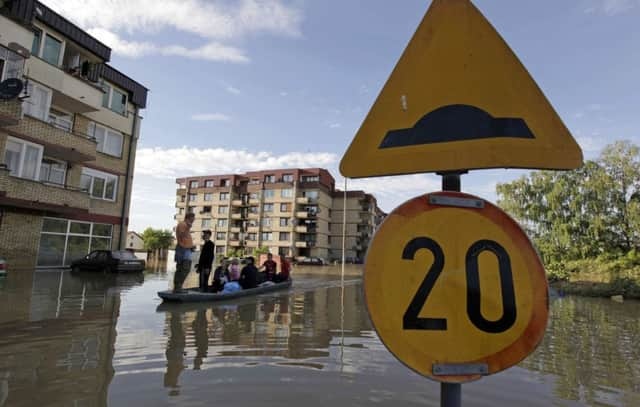A quarter of Bosnians left with no clean water


Zlatko Lagumdzija said the destruction was “terrifying” and compared it to Bosnia’s 1992-95 war. At least 35 people have died in Serbia and Bosnia in the flooding, the worst in a century.
Rescue workers in the Balkans also revealed yesterday that a new health hazard was being posed by the decaying bodies of tonnes of drowned livestock.
Advertisement
Hide AdAdvertisement
Hide AdResidents have been warned not to touch dead animals and soldiers have begun disinfecting land to prevent disease.
The carcasses of thousands of dead animals including cows, pigs, sheep and dogs have been uncovered as floodwaters begin to recede following a rise in temperatures and rainfall lessening.
“There are tonnes of dead animals that we must dispose of,” Aleksandar Vucic, Serbian prime minister, told a government meeting yesterday.
In the northern Bosnian town of Samac, troops used ropes to pull nearly 400 dead cows out of a barn that had been flooded and drove the carcasses away on trucks.
Flood waters had risen within hours, engulfing farmyards and homes with little of no warning. Many farmers did not have time to let their animals out of barns to try to swim to safety.
Dr Zeljko Ler, Bosnia’s chief epidemiologist, said: “Dead animals are a special problem and those have to be removed and destroyed properly.”
Dr Ler said acute stomach ailments and diseases including hepatitis and typhoid often occur after flooding. “We are warning the population to drink only boiled or bottled water. There are still no mass infections but for some diseases the incubation period is 14 to 21 days.”
Chief Serbian veterinary inspector Sanja Celbicanin said 140 tonnes of drowned animals had been destroyed so far but much more work lay ahead.
Advertisement
Hide AdAdvertisement
Hide AdMs Celbicanin said that around 1,900 sheep and lambs died in one area of central Serbia alone, adding that teams can only work in areas police have deemed safe.
Serbian state television showed army teams spreading out yesterday to decontaminate and disinfect flooded areas to prevent the spread of disease.
Residents in both countries were told not to return to their homes before teams disinfect the area and not to eat any food from flooded gardens, orchards or barns.
Meanwhile, authorities warned that many of the more than 100,000 landmines which are still dotted across Bosnia have been dislodged by the heavy rain, floods and landslides.
Mine removal experts estimate that more than 120,000 landmines remain planted across Bosnia.
Bosnia’s Mine Action Centre (MAC) has appealed for international help in tracking the movement of mines.
Sasa Obradovic, head of the MAC, said: “There have been a number of reports that mines resurfaced after the flood and that landslides have moved whole minefields and markings. We are struggling to pinpoint all these areas and warn people.”